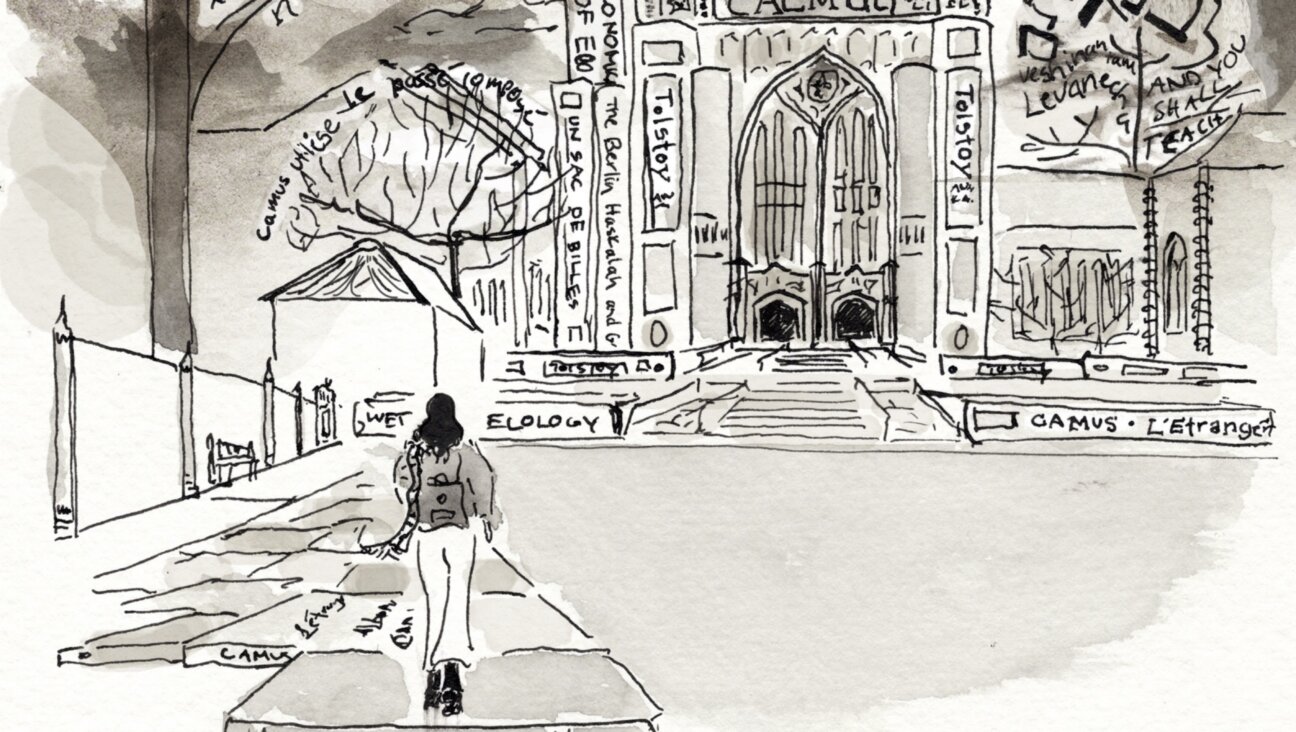Looking Beyond Israel’s Withdrawal From Gaza…
The Book of Judges records the death of Samson in Gaza. Bound to the columns of a Philistine temple, Samson brought the house down on himself and its occupants, crying, “Let me die with the Philistines.” In recent days, Samsonian recklessness and despair have again resurfaced in Gaza.
Meet Yigal Kaminetsky, rabbi of the Gush Katif settlement in northern Gaza. “Disengagement? It is a war about everything,” Kaminetsky declared earlier this month, in the run up to this week’s Israeli Cabinet approval of Prime Minister Sharon’s withdrawal plan. “Zionism has reached the end of the road. The solution? War.”
Kaminetsky’s take on the region may prove correct. This round of summitry, platitudes and plans may yield the same results as those that came before this month’s much-touted Sharm el Sheikh summit. Within two days of the summit, Gush Katif came under a barrage of rocket and mortar fire.
But Kaminetsky was not speaking as a pundit. He was speaking as a cleric who may have soured on a politically democratic, parliamentary State of Israel — a state that in the parlance of religious Zionists is, or at least was, referred to in prayer as reishit semichat ge’ulateinu, “the dawn of our redemption.”
Kaminetsky is not alone in his dissatisfaction with the Zionist experiment and the religious status quo. Recently, a group of rabbis announced that they had reconvened the Sanhedrin, the supreme Jewish religious court that last met in 425 C.E. According to Rabbi Yisrael Ariel, who heads the Temple Institute in Jerusalem, “Whether this will be the actual Sanhedrin that we await, is a question of time — just like the establishment of the State; we rejoiced in it, but we are still awaiting something much more ideal.”
Notice he said “rejoiced” in the past tense. Notice his hope for “something much more ideal.” For some, that ideal “something” is the restoration of the monarchy, and the abolition of the Knesset and parliamentary democracy.
Mixing religion, nationalism, and messianism creates a volatile but potent brew. It transforms the political and historic into the theological and the millennial, making rational debate and compromise impossible. It makes the widening of borders a sign of God’s favor, and territorial concession a sign of divine displeasure.
It can also distort religious norms for the sake of nationalism. After Israel regained the Temple Mount in the Six-Day War, Jewish religious authorities ruled that Jews were prohibited from ascending to the Temple Mount because the exact parameters of where the Temple stood could not be determined, and Jewish law strictly prohibited the ritually impure from entering the Temple’s precincts. Better to err on the side of caution.
Enter politics. Over the past few years, thousands of observant Jews have visited the Temple Mount.
Religion and politics make a bad mix, like milk and meat. With Sharon’s disengagement plan moving forward, we may soon learn just how difficult the combination will be to digest.
Kaminetsky is joined in his war on the organs of the state by the brother of Israeli Education Minister Limor Livnat. Noam Livnat, who heads up the anti-disengagement Defensive Shield Movement, presented petitions bearing the signatures of 10,000 active and reserve soldiers announcing their refusal to participate in or collaborate with (depending where you stand politically) Israel’s disengagement from Gaza.
The 10,000 signatories, while less than 2% of Israel’s regular forces and reserves, are still a lot of muscle. If those numbers hold and those who signed the petitions keep their word, Israel may be entering a new and unpleasant chapter in Jewish history, one in which the Israeli military becomes less an army of the state and more the militia of the militant or messianic.
Putting tribe before polis is not new. In Deuteronomy, the Bible records the apparent reluctance of the tribes of Reuben, Gad and Menashe to conquer Canaan and cross over from the east bank of the Jordan. Only after Moses admonishes them do they agree to wage war together with their brethren. Later, the Books of Kings record the secession of the northern tribes of Israel from a kingdom led by a descendent of King David. And we know how that ended. In 722 BCE, the Assyrians permanently exiled the northern kingdom. In 586 BCE, Babylon sent Judea into a 70-year exile.
To be sure, opposition to the Gaza disengagement plan is legitimate. Aside from sentimental and religious objections, a serious national security argument for staying can be made. Retired Major General Yaakov Amidror, for example, contends that after Israel withdraws, Gaza will become a base for Al Qaeda. But it is also worth remembering that Amidror stated that the only mistake bigger than the decision to disengage is a decision to disobey an order to disengage.
For a significant portion of the opposition, however, withdrawal from Gaza is not just about geo-strategic concerns: Disengagement from Gaza would mean a deep wound to their religious and worldview. Tragically, this wound that could lead some to prefer no Jewish state at all to one that has to wrestle with the compromises of politics, the imperfections of parliamentarianism and the flaws and foibles of human nature and diplomacy.
Lloyd Green, an attorney, was staff secretary to the Middle East Policy Group of George H. W. Bush’s 1988 presidential campaign.
















